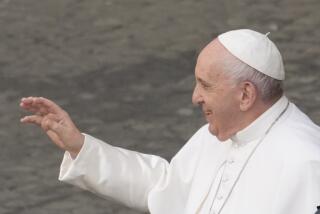Common Themes
- Share via
A leading Eastern Orthodox patriarch and world ecumenical leader said the time has come for churches to turn from seeking agreement on theological issues to trying to address the everyday concerns of people struggling for meaning in a hostile world.
The advice of His Holiness Aram I, catholicos or pope of the Armenian Apostolic Church, comes at a time when churches throughout the world--impelled by the approach of Christianity’s third millennium--are expected to step up efforts to bridge historic divisions.
What is needed, Aram I said in an interview, is a new “theology that matters,” not a rehash of old arguments over dogma which, for the most part, have already ended in agreement on the essentials.
“The churches should no more deal with dogmatic issues, but with real theological issues,” said Aram I, who is also moderator of the World Council of Churches. “This is my concern.”
The real issues that concern the faithful, he said, are both practical and ethical: How to achieve an authentic quality of life in a consumer culture that celebrates material gain and devalues the individual and the environment alike; how to sustain the family, and how to relate to others and the world, remembering the sacredness of all life as the creation of God.
“Today, the church--the people of God--is not so much concerned about the Christian liturgy, the nature of Jesus Christ, the Trinity, these kinds of things,” he said. “Today the people are concerned about the existential issues that they are facing in their actual lives. The people want the church to say something on these issues.”
*
Aram I, who is primate of one of two major branches of Armenian orthodoxy, offered his views during an interview this week in a penthouse suite of the Universal Hilton Hotel in the midst of a two-week visit that marks his first pontifical visit to California since he was named catholicos a year ago. His tour--which includes visits to Sacramento, Fresno and San Francisco--ends Wednesday.
His title is Catholicos of the Holy See of Cilcia. Cilcia was an ancient Armenian kingdom that ended in 1375 and is located in what is now Turkey.
Churches today “are called upon to play a pivotal role in society’s life, particularly concerning those ethical and moral issues that divide our society,” said Aram I, clad in a black robe and fingering the symbol of his office, a diamond-encrusted gold medallion of the Cilician eagle, which hung on a gold chain around his neck.
“The ecological question is not an environmental question, it is essentially an ethical question,” he said. “It is related to God [and] humanity’s relationship to the creation. The whole question of consumerism is a problem in societies today, and particularly in American society.”
The patriarch spoke with surprising candor about divisions within his own church and the need to encourage all churches to address issues that are relevant to “the grass-roots.”
Repeatedly during his visit to Southern California he spoke of “one” Armenian church.
“There has been always and there is just one Armenian church. There will never be two Armenian churches. There is one Armenian church with one history, one theology, one spirituality, one doctrine, one hierarchy and one people,” he said.
Actually, however, the administration of the Armenian church in America has been split since 1933 because of Cold War politics. Fearing Communist infiltration, the Armenian Apostolic Church aligned itself with the Catholicate of Cilicia in Lebanon rather than with the Patriarchate in then Soviet-dominated Armenia.
Today the mother church in Armenia is led by Karekin I, elected last April and a man who held the job Aram I now holds. Both speak of unity, and Aram acknowledges the primacy of Karekin I. But no one knows how quickly the two administrations will merge.
“We have to have the guts to say “no” to the situation that we have inherited from our fathers in this country,” Aram I told The Times. At the same time, Aram I counseled patience and said he does not have a schedule for unification in mind.
*
What is important, he said, both for the Armenian church and Christian churches everywhere, is to make their theology relevant.
Since the ecumenical pronouncements of the Second Vatican Council of the Roman Catholic Church beginning in 1964, and in recent declarations by Protestant and Orthodox bodies such as the World Council of Churches, most attempts at Christian unity have turned on airing theological disputes and gone no further, he said.
“There is a huge volume that contains all these statements. My question is . . . what happened actually in practical terms to this process of growing in unity? What kind of contribution did these statements bring to the process?
“We clarified some of the theological problems that we had, but today the churches are where they used to be in the past,” he said.
Such efforts to promote unity are important, Aram I said, and should continue. But, he said, unity in his own church as well as in the universal church must well up from the needs and life of the faithful.
“The real theology should emerge from the actual life of community and should respond to the needs of that community,” he said. “We must make a clear distinction between theology and philosophy. Philosophy is something on the level of rationality. But theology is part of life.”
More to Read
Sign up for Essential California
The most important California stories and recommendations in your inbox every morning.
You may occasionally receive promotional content from the Los Angeles Times.













